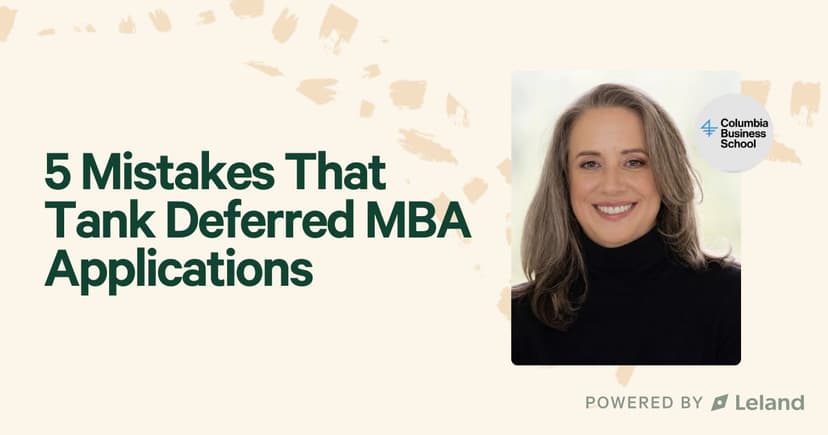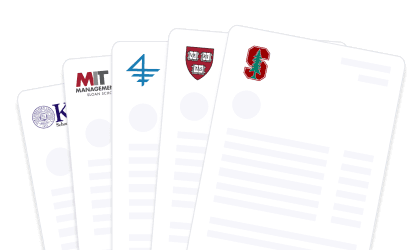Kellogg MBA Acceptance Rates
Discover the latest Kellogg MBA acceptance rates and gain insights into the competitive landscape of admissions at this prestigious business school.
Posted June 13, 2025

Join a free event
Learn from top coaches and industry experts in live, interactive sessions you can join for free.
Table of Contents
Kellogg School of Management at Northwestern University is one of the top business schools in the United States. Aspiring MBA candidates often wonder about the acceptance rates at Kellogg and how they have evolved over the years. In this article, we will explore the Northwestern Kellogg MBA acceptance rates, analyze the trend over the last 10 years, and provide insight on how to estimate your chances of admission.
Northwestern Kellogg MBA Acceptance Rate (2023)
Each year, Kellogg aims to enroll a diverse and talented class of students who will contribute significantly to the community. While the acceptance rate can vary from year to year, the Northwestern Kellogg MBA acceptance rate is approximately 20%. It is important to note that this figure is subject to change with each admissions cycle.
If you are considering applying to Kellogg, it is essential to understand the acceptance rate along with other factors that contribute to a successful application. These factors include your academic credentials, work experience, extracurricular involvement, essays, letters of recommendation, and interview performance. The admissions committee evaluates candidates holistically, taking into account both quantitative and qualitative aspects of their profiles.
When it comes to academic credentials, Kellogg looks for candidates who have excelled in their undergraduate studies. While there is no specific GPA requirement, a strong academic record is generally expected. Additionally, the admissions committee considers the rigor of the applicant's coursework and the reputation of the institution they attended.
Work experience is another crucial aspect of the application. Kellogg values candidates who have demonstrated leadership potential and a track record of professional success. This can be showcased through promotions, increased responsibilities, and significant achievements in the workplace. The admissions committee also considers the industry and functional diversity of the applicant's work experience.
Extracurricular involvement plays a significant role in the evaluation process as well. Kellogg seeks candidates who have actively engaged in their communities and have made a positive impact outside of their professional lives. This can include involvement in clubs, volunteer work, entrepreneurial ventures, or leadership roles in organizations.
The essays and letters of recommendation provide an opportunity for applicants to showcase their personal qualities, aspirations, and motivations. Kellogg looks for candidates who can articulate their goals and demonstrate a clear sense of purpose. The essays should reflect the applicant's unique perspective and highlight their potential contributions to the Kellogg community.
Finally, the interview is an important component of the application process. Kellogg conducts interviews by invitation only, and they are typically conducted by alumni or admissions staff. The interview provides an opportunity for the applicant to further demonstrate their fit with Kellogg's values and culture. It is essential to prepare for the interview by researching the program, reflecting on personal experiences, and practicing responses to common interview questions.
How to Know What Your Chances of Admission to Northwestern Kellogg Are?
While Kellogg does not publicly disclose the specific evaluation criteria or formula used to assess candidates, there are ways to estimate your chances of admission to Northwestern Kellogg. Keep in mind that these estimates are not absolute guarantees, but rather informed guesses based on historical data, self-assessment, and insights from admissions experts.
One useful tool for estimating your admission chances is the GMAT/GRE score percentile. By comparing your score percentiles with the average scores of admitted students, you can gain a rough understanding of where you stand in the applicant pool. However, it is important to remember that test scores are just one part of the overall evaluation process.
Another helpful resource is networking with current students or alumni. Reach out to them to gain insights into their experiences with the application process and how they assessed their chances of admission. Their perspectives can provide valuable information about what the admissions committee may be looking for and how you can tailor your application to stand out.
Kellogg Acceptance Rate FAQs
1. What is the Kellogg MBA acceptance rate for international students?
Kellogg School of Management has a global outlook and values the perspectives of international students. While the exact acceptance rate for international students may vary from year to year, Kellogg strives to create a diverse and inclusive community by admitting talented candidates from all around the world.
2. How does Kellogg evaluate candidates with non-traditional backgrounds?
Kellogg values diversity in its applicant pool and welcomes candidates with non-traditional backgrounds. The admissions committee assesses candidates based on their potential for success in the MBA program and their ability to contribute unique perspectives to the Kellogg community. If you have a non-traditional background, it is essential to highlight your strengths, transferable skills, and achievements throughout the application process.
3. Are there any specific quantifiable criteria used in the admissions process?
While Kellogg does not publicize specific quantifiable criteria, such as minimum GPA or work experience years, the admissions committee considers a range of factors when evaluating candidates. These include but are not limited to academic performance, standardized test scores, professional achievements, leadership potential, interpersonal skills, and community involvement. It is crucial to present a well-rounded application that demonstrates your abilities in these areas.






























